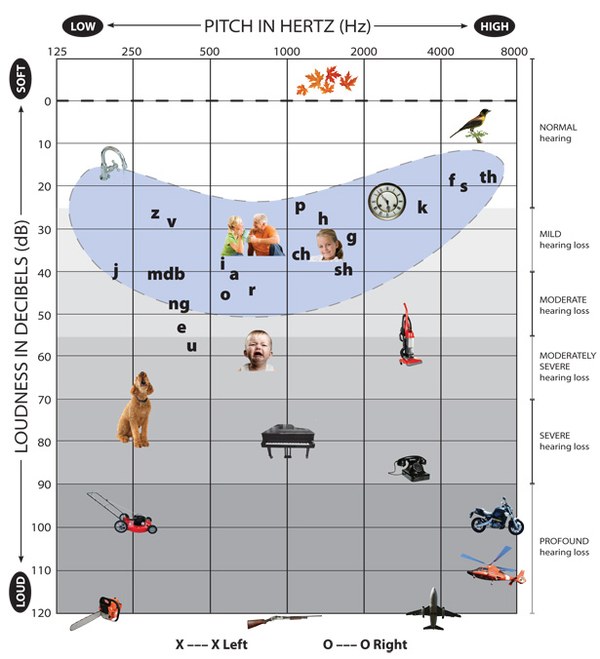Patient Management Plan (WM)
Introduction
You had a hearing assessment on ______________ at the Audiology department.
These are the results of your hearing test
The chart below will help you to get a general view where specific speech and environmental sounds lie. From top to bottom, you can see that sounds are getting louder, and from left to right, the tone of each sound is getting higher in pitch. This may help you and your family to understand the difficulties you are experiencing during communication.

What type of hearing loss do I have?
- Normal hearing with a slight loss at some levels
- Mild hearing loss: This means you may have difficulty following speech, especially in noisy situations. This type of loss is often noticed by family or friends first rather than one self.
- Moderate hearing loss: You have difficulty following speech and misses other quiet sounds. Amplification is very successful for this loss but you will also need to use good listening tactics. Lip-reading classes could benefit people with this hearing level.
- Severe hearing loss: Difficulty hearing speech even in quiet surroundings and you may not hear general noises such as traffic, unless they are loud. Amplification is very successful for this loss, but you will need to use good listening tactics. Lip-reading classes could benefit people with this hearing level.
- Profound hearing loss: Inability to hear most sounds unless they are very loud. Amplification is often useful but you will also need to rely on good listening tactics and concentration. Lip-reading classes would also be useful for people with this hearing loss. Patients in this category may also use British sign language and watch sign assisted programs.
Notes about your appointment
We have discussed your hearing test results with you and made the following recommendations:
- We discussed why a hearing aid may not be suitable for your hearing levels at present.
- We discussed why a hearing aid would be beneficial for you. However, at present, you decided not to have a hearing aid fitted.
- You may benefit from using communication tactics to help you hear better. Sometimes friends and family also need to adapt their communication. Please see the leaflet on communication tactics we have given as well.
- You need to be seen by the Ear, Nose & Throat Specialist for the following reason:
_____________________________________________
_____________________________________________
_____________________________________________
We recommend you have your hearing re-tested every three years or sooner if you notice any further hearing difficulties.
When you would like to have a new hearing test your GP will need to make another referral to the Audiology Department through the NHS electronic referral service.

